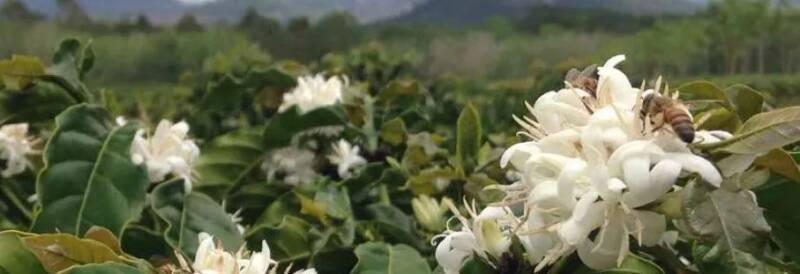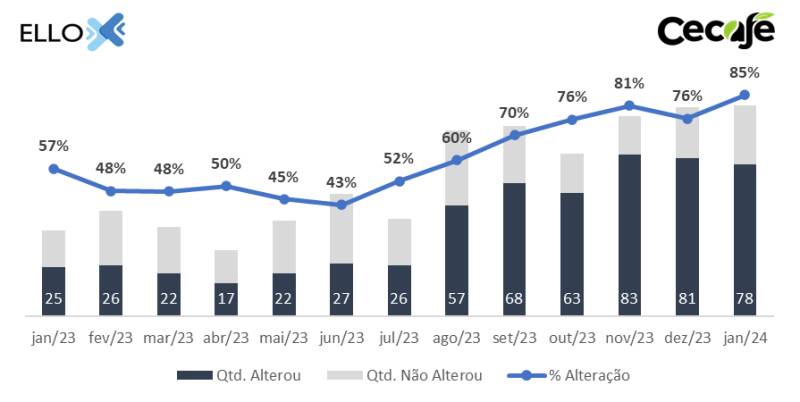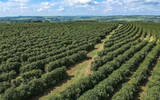Brazil's coffee bean production is unstable, and ship delays in Santos port slow coffee exports
Recently, the Brazilian exporters Committee Cecafe recently released a statistical report. In January 2024, Brazil exported 3.961 million bags of 60kg coffee, a record number for the first month of the year and an increase of 39 per cent compared with the same period last year, the report said. Foreign exchange earnings have increased by 30.4%, jumping from $615.5 million to the current $802.5 million.

In January this year, the largest export was Arabica coffee beans, with 3.208 million bags, accounting for 80.98%. Shipments of Robusta coffee beans, the second largest, increased by 50.35 per cent to 457000 bags, accounting for 11.56 per cent of the total. Brazil's coffee exports performed well in January, so the president of Cecafe said it was good news in the near term to do well in the face of global geopolitical conflicts and affected by the Red Sea crisis and the drought on the Panama Canal.
Moreover, the President also analyzed that the situation in Brazil could be further complicated by the continuing war between North Africa and the Middle East, as well as the lack of rainfall in Central America, and the increase in freight rates or the shortage of ships. Exporters already face high costs due to continued delays and changes in the size of ships and short opening hours.

At the same time, it was also reported that there were changes in the spot market price of coffee in Brazil. The spot price of Arabica coffee rose slightly by 0.86% throughout the month, but the spot price of Robusta coffee rose sharply by 12.6%. The main reason is that the weather changes frequently and the yield in the new season is uncertain. Robusta coffee production is clearly lower than expected, so Brazil's domestic spot prices have risen sharply along with international prices, although prices are high, but producers are also reluctant to sell coffee beans.
In addition, the problem of ship delays in the port of Santos, Brazil's largest port, is becoming more and more serious. It is reported that the rate of change in stopovers and delays at Santos port stores reached 85% in January 2024, the highest percentage recorded so far, more than 81% in November last year. It has been revealed that due to the physical space limitations of the terminal space, it is difficult for the terminal to receive goods, and these problems have led to regular delays in port cargo and shipyards full of containers. Of these, 13 per cent were delayed for more than 4 days, 54 per cent for 3-4 days and only 19 per cent for 2 days, greatly slowing down the export of coffee.
Important Notice :
前街咖啡 FrontStreet Coffee has moved to new addredd:
FrontStreet Coffee Address: 315,Donghua East Road,GuangZhou
Tel:020 38364473
- Prev

Introduction of Yellow Bourbon Coffee beans in Queen's Manor, Mogiana, Sao Paulo, Brazil
Brazilian coffee plays an important role in the global coffee market, all because Brazil says that the world's largest coffee producer and exporter accounts for 1/3 of the world's coffee exports. Mainly grow Arabica and Robusta varieties (also known locally as Cornelon Conilon) coffee. Brazil Coffee
- Next

Elegant! Young people returning to their hometown make their own "charcoal-roasted coffee"
▲ Click to follow | Daily boutique Coffee Culture Magazine Coffee Workshop nowadays, with the gradual popularization and deepening of coffee culture, more and more young people begin to like this fragrant coffee drink. And the young people who return to the village for the Spring Festival bring the coffee culture they have come into contact with in the city to their hometown. Besides, he
Related
- What grade does Jamaica Blue Mountain No. 1 coffee belong to and how to drink it better? What is the highest grade of Blue Mountain coffee for coffee aristocrats?
- What are the flavor characteristics of the world-famous coffee Blue Mountain No. 1 Golden Mantelin? What are the characteristics of deep-roasted bitter coffee?
- Can I make coffee a second time in an Italian hand-brewed mocha pot? Why can't coffee be brewed several times like tea leaves?
- Hand-brewed coffee flows with a knife and a tornado. How to brew it? What is the proportion of grinding water and water temperature divided into?
- What is the difference between Indonesian Sumatra Mantinin coffee and gold Mantinin? How to distinguish between real and fake golden Mantelin coffee?
- What does bypass mean in coffee? Why can hand-brewed coffee and water make it better?
- Unexpected! Ruixing Telunsu lattes use a smoothie machine to foam milk?!
- % Arabia's first store in Henan opens into the village?! Netizen: Thought it was P's
- Does an authentic standard mocha coffee recipe use chocolate sauce or powder? Mocha Latte/Dirty Coffee/Salty Mocha Coffee Recipe Share!
- What is the difference between Vietnam egg coffee and Norway egg coffee? Hand-brewed single product coffee filter paper filter cloth filter flat solution!

